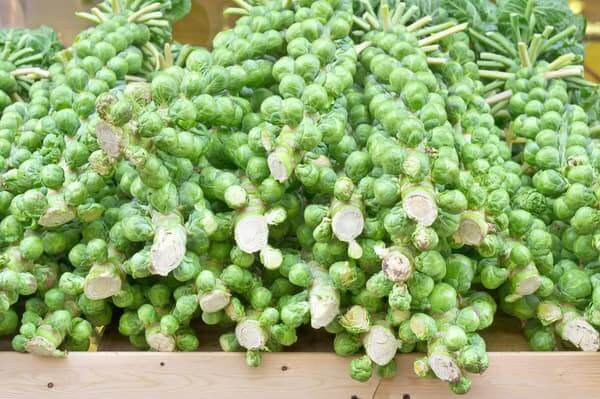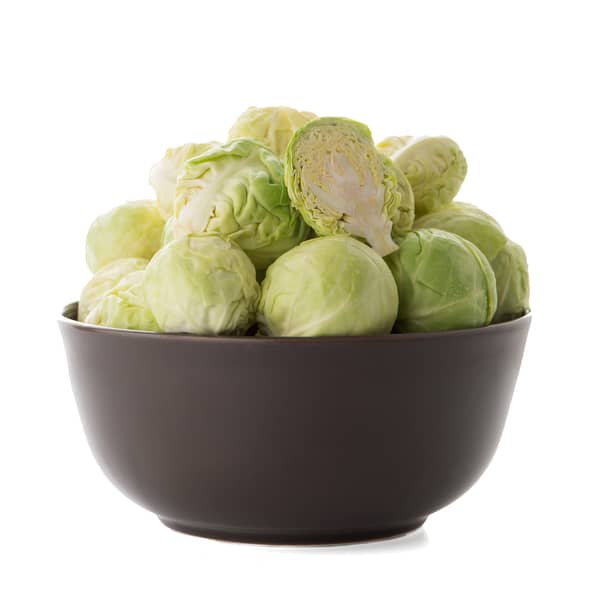
Brussels Sprouts are a delicious and nutritious food – if you love them, of course. The vegetable isn’t everyone’s favorite, but those who love them sauteed, roasted, or in a salad may be tempted to share them with their dog. So, can your dog eat Brussel sprouts?
Brussel sprouts are a healthy option for dogs when served correctly and in moderation. The green vegetable is full of vitamins, antioxidants, and fiber that can lower inflammation while supporting your dog’s overall health.
While Brussels sprouts are safe for your dog, they can cause gastrointestinal issues, including increased gas and diarrhea. Make sure to consult your veterinarian prior to introducing any human food to your dog’s diet.
Our article tips are here to make sure that you understand the pros and cons of the leafy veggie before you let your dog eat brussels sprouts.
Benefits of Brussels Sprouts
The health benefits of Brussel sprouts are extensive for both humans and their dogs. Dog people who eat brussels sprouts likely want to share all of that goodness with their dog.
As part of the cruciferous vegetable family, Brussel sprouts are a diverse group from the mustard family that includes cauliflower, broccoli, cauliflower, kale, and collards. “Cruciferous” comes from the Latin Cruciferae and means “cross-bearing,” since the veggies have four petals that favor across.
Brussels Sprouts are Nutrient-Rich

All of the cruciferous vegetables are chock full of nutrients. Brussel sprouts, in particular, are vitamin and mineral-filled, giving your dog’s diet a boost.
But what exactly is in Brussels sprouts that make them so nutritious for both people and dogs to eat?
Vitamins
The veggie is chock full of vitamins, including:
- Vitamin A: Vitamin A promotes normal vision, a properly functioning nervous system, and keeps the heart, lungs, and other organs in dogs working correctly.
- Vitamin B: Brussels sprouts contain Vitamins B1 and B6. The Vitamin B family supports proper blood circulation and overall heart health
- Vitamin C and Vitamin K: Both of these vitamins are great for a dog’s immune system and bone health.
- Vitamin E: Vitamin E is an antioxidant that protects cells from the damage free radicals cause when the dog’s body converts food to energy.
When dogs eat brussels sprouts, they are chowing down on an excellent source of vitamins!
Minerals
Brussel sprouts are rich in minerals that are essential to any dog’s diet. Two minerals found in Brussels sprouts:
- Manganese: Manganese helps dogs digest protein and amino acids.
- Potassium: Potassium is essential for the healthy function of dog muscles, enzymes, and nerves. It also ensures your pup maintains proper fluid balance.
Kaempferol
Brussel sprouts also have an antioxidant called kaempferol, which has numerous health benefits.
Studies show that kaempferol can help to lower inflammation and prevent oxidative damage in animals.
Dietary Fiber
Fiber is essential for colon health, and Brussel sprouts are full of fiber! However, there is a downside to fiber – check it out below.
Brussels Sprouts are Low in Calories
If you need an occasional treat that is low in calories, the Brussels sprout is a great option. Your pup will not pack on the pounds with a bite of the leafy green vegetable!
The Downside of Brussel Sprouts

Brussel Sprouts may be full of vitamins and minerals, but there are several reasons you should skip feeding the green food to your dog.
Brussels sprouts contain lots of fiber, which in moderation is good as fiber helps ensure regular, healthy bowel movements.
Brussel sprouts have high amounts of isothiocyanate, a substance that helps the intestinal muscle to get all of that digested food across the intestinal tract. That’s not what causes excess gas, however. It’s the excess bacterium built up that causes extreme flatulence.
So, if your furry buddy eats too many Brussel sprouts or has a sensitive stomach, the green vegetable can cause bloating, gas, and diarrhea, leaving your pup uncomfortable and miserable. And while that isn’t fun for anyone to deal with, it’s typically not harmful or life-threatening.
If they have intense stomach issues, such as diarrhea, over several days after consuming Brussel sprouts, contact your veterinarian. Also, if your pup has any allergy or dietary issues, do not feed him Brussels sprouts without consulting your veterinarian.
Brussels Sprouts Serving Size for Dogs
When feeding your dog Brussel sprouts, it’s important to know the proper serving size and what recipes are dog-friendly.
In some cases, dogs eat until they are stopped if allowed. Do not let your dog eat more than the recommended amount of Brussels sprouts to avoid any unwanted gastrointestinal issues. People should do the same with high-fiber foods like Brussel sprouts!
Serving Size Depends on the Size of Your Dog
The size of your dog determines the amount of Brussel sprouts they should eat. For any dog, a maximum serving size should not exceed three Brussel Sprouts. Smaller pups need only 1/4 to 1 Brussels sprout at a time.
Brussels sprouts should be served in moderation only from time-to-time.
If your dog has never tried a Brussel sprout, start out with small portions. Depending on your pups size, give 1/4 to 1/2 of a cooked Brussel sprout.
If your dog doesn’t experience any kind of side effect, you can feed him the healthy veggie in moderation. It’s packed full of nutrients, and neither humans nor dogs need large portions of the vegetable.
Preparing, Cooking, and Serving Brussels Sprouts to Your Dog
Dogs do not need gourmet brussels sprouts with olive oil, spices, salt, and pepper. Keep it simple – they won’t know the difference!
Selecting, prepping, and cooking Brussel sprouts is easier than you think. Here are some tips and tricks:
Selecting and Prepping Your Dogs Brussel Sprouts
When you pick Brussel sprouts up at your grocery store or local farmer’s market, look for firm, green sprouts.
As you would with any other veggie, wash them thoroughly.
You can cut off the stem but leaving intact the leaves. Slice the sprouts in half, to make it easier for your dog to eat.
Cooking Brussels Sprouts for your Dog
Once you have your Brussel sprouts prepped, it’s time to get them ready to serve to your dog.
Here are several ways to cook your Brussel sprouts:
- Steam: Add Brussels sprouts and water into a 3 to 4-quart pot and cover. Cook over high heat for five minutes, or until they are tender.
- Microwave: Add Brussels sprouts and water to a 1-1/2-qt. microwave-safe dish. Cover the dish and microwave on high for six to eight minutes. Stir every two minutes, and check to see if they are tender enough for your liking.
- Boil: In a pan, add Brussel Sprouts and water, cover, and gently boil for 15-20 minutes, or until tender.
Do not overcook Brussels sprouts as they will lose their nutritional value.
Make sure you cook them as raw Brussels sprouts are not good for your dog’s digestive system.

Serving Brussel Sprouts to Your Dog
Dogs can eat plain, cooked Brussels sprouts as an occasional treat.
While dog foods contain veggies, you can give them an extra boost. Add the cooked, chopped Brussel sprouts to the dog food your pup loves to eat.
While you can’t make your dog love vegetables, you can also sneak finely chopped Brussels sprouts into his favorite homemade cookies for a boost in nutrients.
Does your dog make a face when you feed him the vegetable? Maybe just skip it if so!
What Vegetables Are Bad For Dogs?
While Brussels sprouts are safe for dogs, there are vegetables that you should never let your furry friend eat.
Or maybe you’re pet sitting or dog walking and want to be extra precautious. You obviously love your dog and want to make sure that you are taking care of him!
Onions
Onions are part of the Allium family, which also includes leeks and chives, and are toxic to dogs. Dogs who eat onions can experience stomach pain, vomiting, and diarrhea, and can cause red blood cells to rupture. You do not want to feed them onions of any kind, but you also want to avoid garlic as well. The symptoms of Garlic toxicity are virtually identical to that of onions, so avoid at all cost.
Mushrooms
Dogs can suffer serious complications or even death from eating wild mushrooms. Out of all of the vegetables, mushrooms are one you don’t want to mess with. There are some mushrooms that dogs can safely consume, but because the donwisde of eating the one is so severe, your best bet is to simply not fed your dogs mushrooms of any kind, period.
If your dog consumes anything that may be harmful, contact your veterinarian immediately.
Conclusion
So, is it safe for your dog to eat Brussel sprouts? The bottom line is YES! They are nutritious, healthy, and can give your dog an immune boost. Just be sure to feed your pup the green leafy veggie in moderation, and only occasionally.